FED 5 OWNERS MANUAL
All material copyright by Mark
Tharp, 2000
Introduction:
The Fed 5 is the final development of the
earlier Fed and Fed 2 cameras, being themselves copies of the
Leica II and III 35mm cameras. Many of the controls and much of
the layout will be familiar to Leica screwmount users.
While certainly not in the same
class as the Leica III, or by reputation even the earlier Fed 2 and 3, the Fed 5 actually has some advantages. Tops among its advantages is the fact that you are not carrying an irreplaceable collectors item should you decide to use it. The viewfinder is also marginally brighter than a Leica screwmount and is coincident with the rangefinder. The Fed 5 has a selenium match needle system, a pop-up rewind knob, and a hotshoe. Above all, the film can be loaded, in daylight, with the ease and convenience of a modern 35mm camera - the entire back comes off!
As compared to earlier Fed cameras, the Fed 5 offers the aforementioned meter, brightlines in the viewfinder - including parallax compensation for the 50mm lens, and autoreset on the film counter. The build quality tends to be somewhat poorer than the earlier Fed models.
Without getting into ugly specifics about build quality, the primary functional disadvantage of the Fed over Leica screwmounts is the relatively slow top shutter speed of 1/500th sec. But when did anyone ever get a Leica to actually snap its shutter at a true 1/1000th anyway?
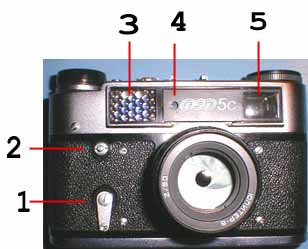
| 1. Self Timer |
4. Rangefinder Optic |
| 2. Timer Release Button |
5. Viewfinder |
| 3. Meter Window |
|
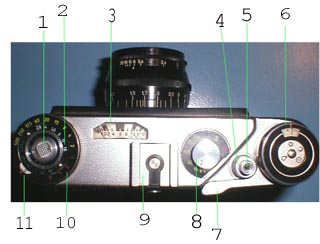
| 1. Rewind Knob |
7. Winding Lever |
2. GOST Setting Ring |
8. Shutter Speeds |
| 3. Match Needle Window |
9. Hot Shoe |
| 4. Rewind Release |
10. Shutter Speed Meter Ring |
| 5. Shutter Release |
11. Match Needle Numbers |
| 6.Exposure Counter |
|
LOADING / UNLOADING FILM
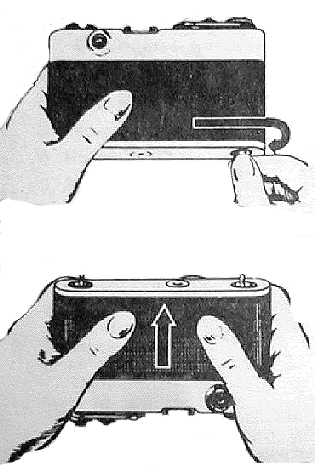
To access the film compartment you remove the one-piece back.
It is secured by two rotating latches on the bottom plate. Rotate
each latch toward the outside of the camera body as shown in the
illustration above. Slide the back off as shown. Installation is
the reverse of this proceedure.
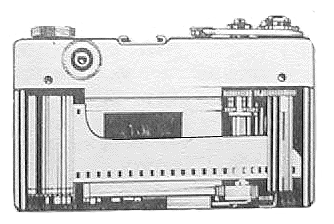
To load film place the 35mm cartridge onto the left spindle,
with the film leader placed into the takeup spool on the right.
Note that the takeup spool pulls the film UNDER the spool, so
feed the leader so that it passes OVER the sprockets and then
UNDER the takeup spool. You should now be ready to take pictures!
|
When you are ready to rewind the film you must FIRST RELEASE
THE SHUTTER. Failure to do so may cause the shutter to behave
erratically the first few times when you next load film.
Locate the rewind knob in the center of the match needle readings at the top left of the camera. Use your finger tip on the knurled surface to turn it counterclockwise; release and allow the rewind knob to spring up. Next, press down on the rewind collar (shown at right) which surrounds the shutter release - this is not well designed as the winding lever is in the way; I have to use my fingernail. Rewind the film until no
resistence is felt from the film. |
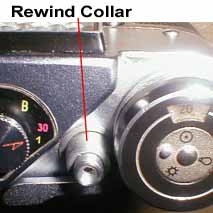 |
The back may now be opened and
the film removed. Press down on the rewind knob, and rotate clockwise to lock back into position.
FILM ADVANCE / COCKING THE SHUTTER
The film advance lever is a single stroke mechanism, ie
pushing the lever to the full extent of its travel will advance
the film one full frame and cock the shutter. Hold the camera
with the lens pointing away from your body, push the lever with
your thumb smoothly in one continuous motion until it reaches the
limit of its travel. Do NOT allow the lever to snap back against the camera housing - this has been known to cause damage to the shutter speed mechanism - instead just smoothly move your thumb back around to the initial position and release.
FILM COUNTER
The film counter dial is automatically reset when film is rewound. The
counter will advance up each time the film is advanced.
SETTING SHUTTER SPEED
IMPORTANT!!! NEVER CHANGE SHUTTER SPEEDS
WITHOUT FIRST COCKING THE SHUTTER!!! In the worst case,
you may do major damage to the mechanism. At best, you will find
the shutter behaves erratically for a few frames.
The shutter speeds are located immediately next to the
accessory shoe and are contained on a dial numbered B, 30, 1, 2,
4, 8, 15, 60, 125, 250. and 500. "B" will open the
shutter for as long as you press down on the shutter button.
"30" is 1/30th of a second and is the synch speed for
flash. "1" is for one second. All other numbers
are the denominator of a fraction of a second, of which the
numerator is the number 1. In other words, 1/2, 1/4th, 1/8th of a
second, and so on. You may wonder why 1/30th is out by itself and
not between 1/15th and 1/60th as would appear logical. This is
because the 1/30th setting works differently than any other,
timing the full opening of the shutter to coincide with the
maximum light output from the flash.
To change speeds FIRST COCK THE SHUTTER. Now grasp the speed
selector knob and gently pull up while rotating the red arrow to
the desired speed as marked on the dial. You will notice that the
knob moves easily from 1/30th counterclockwise until it reaches
the 1/15th mark. At that point resistance will be felt, and a
noise like the winding of a clock will be heard. This is normal
as the slow speed mechanism is engaged. The speed selector cannot
be moved counterclockwise farther than the 1 second mark. DO NOT
TRY! To go from on second to 1/30th you must turn the knob
clockwise all the way around past B. Likewise, do not attemp to turn the speed selector clockise past the 1/30th mark.
SETTING AND USING THE METER
Match needle systems are no longer common and are confusing to the new user. In practice, it is really quite simple. Not convenient, mind you, but simple. Note the match needle window next to the hotshoe and the meter settings rings just above the viewfinder. All meter settings are made with these controls and windows.
First, hold the camera normally, with the lens pointed away. Choose the correct film speed by setting the correct GOST (label looks like "roct") number at the engraved marker on the innermost ring of the meter scale. GOST conversions are found at GOST. Now point the camera at the subject and note the number under the needle in the match needle window. Turn the outermost ring until the match needle number appears in the small window. You may then select any F-stop and shutter speed combination which appear opposite each other on the outer shutter speed ring and the next inner ring.
Example - GOST setting is 250, match needle reads "5", combinations of f2.8 and a shutter speed of 1/500th should give a proper exposure. So should f5.6 at 1/125th as well as f11 at 1/30th.
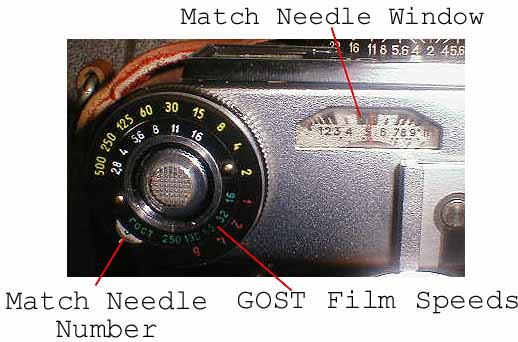
The Fed 5 meter is a selenium meter, has no battery, and cannot be turned off.
USING THE VIEWFINDER/RANGEFINDER
Now note the bright "spot" in the middle of the
viewfinder. This is the rangefinder. It will provide a spit image
of the object in your viewfinder. Rotate the focus ring left or
right until the split image merges into a single image. If this
cannot be accomplished, you are too close to the object for that
particular lens.
What you see in the viewfinder is not exactly what the film "sees." At normal distances, and with the "normal" 50mm lens, there is little difference. Change to a wide angle or telephoto lens, or try and move in close and other factors come into play.
Many, though apparently not all Fed 5's have a "brightline" type viewfinder. The Fed 5 viewfinder has a field of view roughly comparable to a 50mm lens as seen inside the outer brightline frame. If your Fed 5 does not have a brightline frame, your field of view is somewhat wider than a 50mm lens. If you use a wider lens, say a 35mm, you will capture somewhat more than you can see through the Fed 5 viewfinder. Conversely, longer focal length lenses take in smaller and smaller areas, until at 135mm the lens may see only the area encompased by the rangefinder dot. The solution here is to use one of the many available auxiliary viewfinders. These come in both dedicated (a single viewfinder to match a single focal length), multiple brightlines, and adjustable varieties. These are inserted into the accessory shoe and will provide the proper field of view for the lens desired.
When moving in for a closeup you run into the problem that the lens is in the middle of the camera, while the viewfinder is well off to the side. If using an accessory viewfinder, the problem is reduced as the accessory shoe positions it directly over the lens, but the finder is still raised above the lens. This is known as paralax error. Many (most?) Fed 5's with brightline finder also have a parallax correction brightline for the 50mm lens only. Inside the regular brightline is another set lower, and to the right. In theory, these lines show the field of view of the factory supplied Industar 61 LD at its minimum focus distance. Some accessory viewfinders also have paralax correction. Some of the macro lenses made by Leitz came with an optic that was positioned over the viewfinder and "corrected" the paralax. I am not aware of any Russian equivalents.
USING FLASH
The FED 5 synchronization is designed for use with electronic flash at a
shutter speed of 1/30 second. For those unaccustomed to such slow synch speeds, be aware that you may have some "ghosting" problems with fast films in an average lighted room. Use 100 asa or less and it should not be a problem.
SELF TIMER
Your Fed 5 also has a timer to allow delayed shutter release.
This is commonly used for group shots while the camera is on a
tripod and the photographer wants to be in the picture as well. I
frequently use it for slow speeds when I wish to avoid "camera
shake".
First, advance the film. Second, turn the self timer lever
counterclockwise until it points at the 12:00 o'clock position.
When ready to release, press the timer release button directly
above the self timer lever.
GOST FILM TYPE REMINDER
In the center of the film counter ring are three icons for sun, incandescent light, and flash. These appear to be designed to work as a reminder for the type of film, but
how is a mystery.
CHANGING LENSES
Your Fed 5 uses Leica Thread Mount (LTM) screw threads, 39mm X
1mm. This allows you to use not only the lenses made in Russia
for the Fed, Zorki, Mir, etc., but also other LTM lenses made by
Nikon, Contax, Steinheil, and currently by Voigtlander, as well
as Leica.
CAUTION: KMZ (Zenit, or sometimes Zenith) made some LTM mount lenses for their early SLR cameras and these have a different film registration depth. They may mount, but will not operate properly except at infinity.
Caution: Not all LTM mount lenses will
work with your Fed 5. Some lenses use a "tongue"
to push against the rangefinder cam, rather than a cylinder. As
the shape of the cam itself is different on the Fed from that of
a Leica screwmount, it may not push pass the cam to completely
seat the lens. Never try to force a lens into your Fed 5 lens
mount.
To remove the lens, simply turn the barrel of the lens
counterclockwise until it comes out. To install a lens, carefully
square up the threads and gently turn clockwise, making certain
that it is not cross-treaded. Continue until the lens is firmly
against the camera body, but do not overtighten.
Please email comments, suggestions to [email protected]





